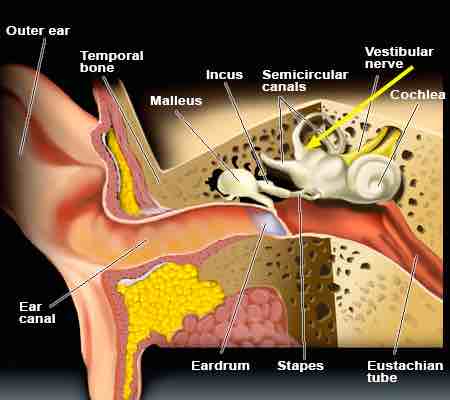- All You Need to Know
How long does vertigo last?
Vertigo is a very distressing disturbance of the balance mechanism in the inner ear; should some crystals become lodged in one of the semicircular canals, preventing the fluid from swishing about normally, an alarming spinning of the world begins.
It often starts after banging the head, knocking crystals loose from the tiny fronds where they are situated in the balance mechanism.
It can also occur after a whiplash injury that affects the blood flow to the brain.
It may also be caused by a stroke in which case immediate medical attention is required if the person is to be spared life-long disability. Do you have high blood pressure, are you diabetic and have you been a smoker?
It is associated with nausea and, in serious cases, you may fall over and begin vomiting.
The astute observer may notice that the eyes are spinning, or flicking in a bizarre fashion; it is called nystagmus.
Organs in the inner ear enable us to keep our equilibrium, and give the brain vital information about the movement of the body; when the receiver in the right ear gives conflicting signals with those from the left to the brain, then we go into a spin.
In clinical practice, knowledge about vertigo is important; turning from one side to the other may provoke an attack, making the patient giddy, and even vomit. Some people, like Mrs Spiertz in this story, can only lie on one side.
Lying on the opposite side, either at night, or on the chiropractic bench may provoke one of the these severe, distressing attacks; the patient wants to move out of the position immediately.
There is a simple solution to vertigo; a Dr Epley worked out a series of manoeuvres that displace the offending crystals from the inner ear. The problem is that the patient has to lie in the very position that makes them feel so awful, and stay there until the spell passes over. In severe cases this will be very distressing.
How long does vertigo last? It may resolve of itself gradually over a few days as the crystals clear naturally of themselves, but sometimes it continues for months.
Each attack may last just a minute or less, or may continue for hours.
With the Epley manoeuvres it will usually clear within a few days. Do not lie in bed but get up and move; carefully or you may fall.
Stugeron is not a good idea; one of its very side effects is vertigo.
Dizziness and vertigo
The yellow arrow indicates where the loose calcium crystals may accumulate.

Medical research shows that drugs have no place in the management of dizziness and vertigo; the Epley manoeuvres are the proven treatment of choice. Finding a chiropractor, skilled in the use of this technique, is the way forward.
But first, if you suffer from hypertension or diabetes, it is best to get immediate medical advice.
If you have a severe cold causing an inner ear infection then this too causes what is known as labyrinthitis; this first requires medical attention. Notice the connection between the Eustachian tube where inflammation may occur, the ossicles connected to the ear drum and the balance mechanism.
More about Mrs Spiertz; this delightful Limburg lady had been completely unable to lie on her left side for years. It would immediately provoke an attack of severe vertigo; no treatment, either her doctor's pills or manipulations by chiropractors had helped.
Until she met Dr Bernard Preston, DC. He had been to a continuing education course on the use of the Epley manoeuvres; and Mrs Spiertz was to be his first guinea pig, or proef konijn in Dutch.
With dramatic results; a local television station was on a fact finding mission about chiropractic to the local clinic. Things did not exactly go according to plan; with hindsight, starting on such a severe case was not the wisest. Bernie rapidly went through a metamorphosis from obscurity to fame, and on to infamy. For the rest of the story, you can enjoy this excerpt from Preston's next book.

How long does vertigo last?
How long does vertigo may be a question demanding an urgent answer.
More from an excellent medical source.
Did you find this page useful? Then perhaps forward it to a suffering friend. Better still, Tweet or Face Book it.
